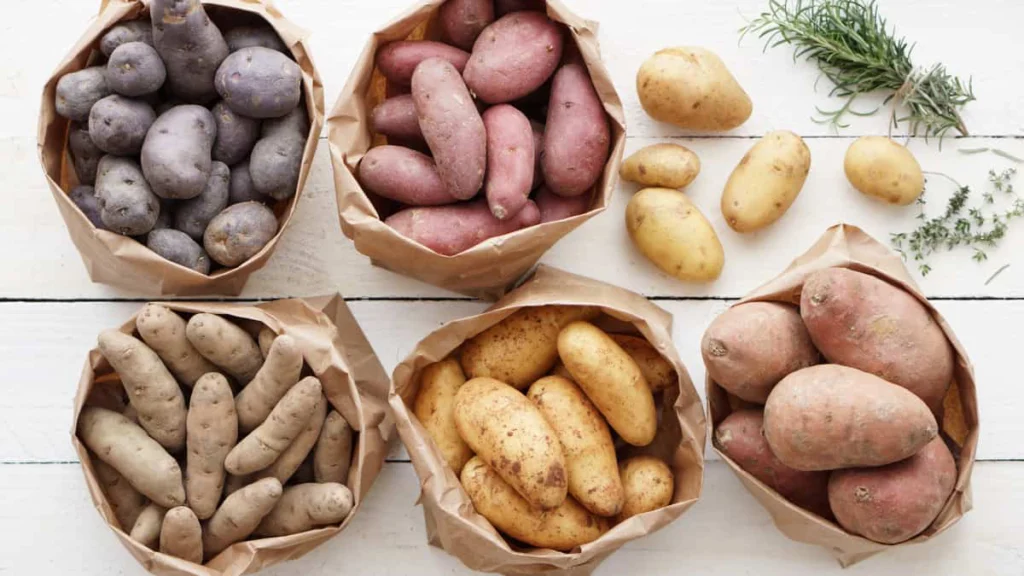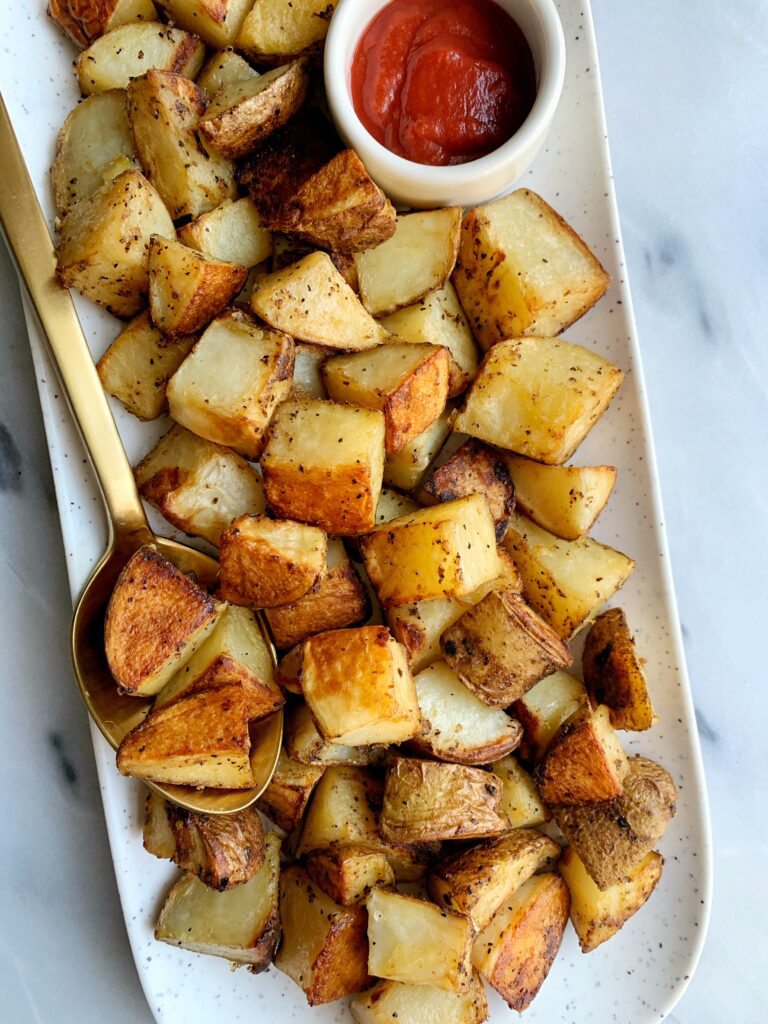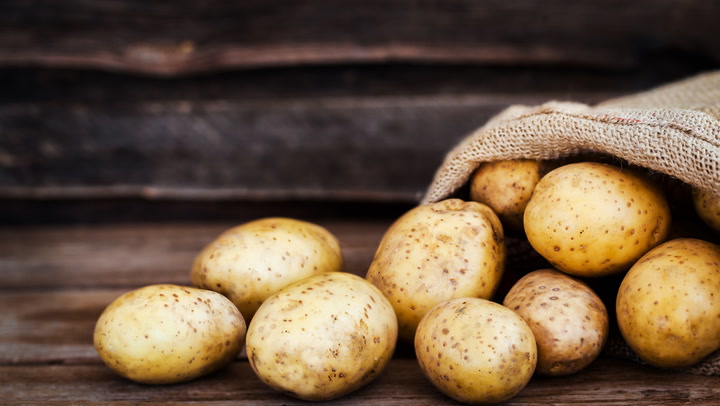Russet Potato, a popular variety known for its versatility and earthy flavor, is a staple in many diets. Understanding the calorie content and nutritional value of russet potatoes is essential for making informed dietary choices.
Types of Potatoes
Potatoes come in several varieties, each with special qualities and recommended uses:
Russet Potatoes: Despite their starchy texture, russet potatoes have a fluffy quality that makes them perfect for baking, mashing, and frying.
Red potatoes: The flesh of these potatoes is waxy and their skins are thin and silky. They are excellent for roasting, boiling, and potato salads since they maintain their shape well in the cooking process.
Yukon Gold potatoes are excellent for mashed potatoes, baking, and frying because of their creamy texture and buttery flavor.
Fingerling potatoes have a solid, waxy texture and are small and elongated. They work great grilled, roasted, or added to salads.
Purple potatoes: The flesh and peel of these potatoes are a vivid purple color. They are adaptable to a range of culinary techniques, including roasting, mashing, and frying, and they contain antioxidants.
Sweet potatoes: They are colored orange, purple, and white, among other hues. They taste sweet and are great for mashing, baking, and preparing pies or fries.
A vast array of culinary options is made possible by the unique flavors and textures that each kind of potato delivers.
Benefits of Potatoes
There are several health advantages to potatoes. They improve digestion and general health because they are a great source of fiber, potassium, and vitamin C. They provide long-lasting energy due to their high carbohydrate content, making them perfect for people who lead active lives. Potassium supports heart health by regulating blood pressure, and antioxidants found in potatoes fight oxidative stress and inflammation. Skin-on or baked potatoes are low in calories and fat despite their high carbohydrate content, which helps with weight management. Antioxidants and vitamin C also support healthy skin. All things considered, potatoes are a wholesome complement to any diet, providing some health advantages.
Calorie Content of Russet Potato
- A medium-sized (5.3oz) skin-on russet potato contains around 110 calories.
- Another source mentions that a medium-baked russet potato with peel and no added salt or toppings contains approximately 164 calories.
Nutritional Composition
When comparing russet potatoes to other starchy vegetables in terms of nutritional value, several key points emerge from the provided sources:
- Carbohydrates: Russet potatoes are high in carbohydrates, with a medium-sized baked russet potato providing around 37 grams of carbohydrates, mainly from starch. Sweet potatoes and red potatoes have similar carbohydrate content, while purple potatoes contain fewer grams of carbohydrates.
- Fiber: While russet potatoes have a lower fiber content compared to sweet potatoes, they still offer some fiber, with a medium-baked russet potato containing about 4 grams of fiber. Sweet potatoes are the highest in fiber among the varieties mentioned.
- Vitamins and Minerals: Russet potatoes are rich in potassium, vitamin C, and B vitamins, contributing to overall health benefits. Sweet potatoes are loaded with vitamin A and have about twice the vitamin C content of russet and red potatoes.
- Calories: A medium-sized baked russet potato contains approximately 164 calories, with most of the calories coming from carbohydrates and a small percentage from protein and fat.
- In summary, while russet potatoes provide essential nutrients like potassium, vitamin C, and fiber, they have a higher starch content compared to sweet potatoes and red potatoes. Sweet potatoes stand out for their higher fiber, vitamin A, and vitamin C content. Each type of potato offers unique nutritional benefits, making them all valuable additions to a balanced diet depending on individual dietary needs and preferences.
Health Benefits of Russet Potatoes
Russet potatoes, a nutritious and versatile vegetable, offer various health benefits that make them a valuable addition to a balanced diet.
Bone Health
The iron, phosphorus, calcium, magnesium, and zinc in potatoes contribute to bone structure and strength. Iron and zinc are crucial for collagen production, while phosphorus and calcium support bone health.
Blood Pressure
Potassium, calcium, and magnesium present in potatoes help regulate blood pressure naturally by encouraging vasodilation, which widens blood vessels.
Heart Health
Potatoes are rich in fiber, potassium, vitamin C, and vitamin B6, which collectively support heart health by lowering cholesterol levels and reducing the risk of heart disease.
Inflammation
Choline in potatoes plays a vital role in maintaining cellular structure, nerve function, fat absorption, and early brain development. Additionally, it helps reduce inflammation in the body.
Cancer Prevention
Folate in potatoes aids in DNA synthesis and repair, reducing the risk of cancer cell formation. Moreover, antioxidants like vitamin C and quercetin protect cells from damage caused by free radicals.
Digestive Health
The fiber content in potatoes promotes digestive regularity and prevents constipation for a healthy gut.
Weight Management
Potatoes’ dietary fiber contributes to weight management by increasing satiety and reducing appetite, helping individuals feel fuller for longer periods.
Metabolism
Vitamin B6 in potatoes plays a crucial role in energy metabolism by breaking down carbohydrates and proteins into glucose and amino acids for efficient energy utilization.
Skin Health
Vitamin C in potatoes acts as an antioxidant that protects the skin from damage caused by environmental factors like sun exposure and pollution. It helps maintain collagen levels for healthy skin texture.
Immunity
Potatoes provide vitamin C that supports immune function, contributing to overall health and well-being.
Incorporating russet potatoes into meals can offer a range of health benefits due to their nutrient-rich profile and diverse array of vitamins and minerals that support various bodily functions.
Difference between the Antioxidant content of Russet Potatoes and Other Potatoes
When comparing russet potatoes to other types of potatoes in terms of antioxidant content, the research reveals interesting insights:
- Russet Potatoes: A USDA study ranked the Russet potato number 17 on a list of the top 20 sources of antioxidants, with a Total Antioxidant Capacity (TAC) of 13.2. This places it above plums, black beans, and Gala apples.
- Red Potatoes: Red potatoes have a different nutrition profile compared to russet potatoes. They are lower in carbohydrates and calories, higher in vitamin K and niacin, and contain more fiber in their skin. Red potatoes also have a Total Antioxidant Capacity that varies depending on the variety, with some having significant antioxidant levels in both the skin and flesh.
- Purple Potatoes: Purple potatoes are rich in antioxidants due to their anthocyanin content, which gives them their vibrant color. They contain four times as many antioxidants as russet potatoes, making them a potent source of these beneficial compounds.
Russet potatoes offer moderate levels of antioxidants, red and purple potatoes stand out for their higher antioxidant content. Each type of potato provides unique health benefits based on its antioxidant profiles, making them all valuable additions to a healthy diet.

Ways to Cook Russet Potatoes for Healthier Options
Russet potatoes can be prepared in various ways to enhance their nutritional value and make them a healthier choice. Here are some methods based on the provided sources:
Roasting with Olive Oil and Herbs
- Roasting russet potatoes with olive oil, dried rosemary, garlic, thyme, paprika, and parsley can create a flavorful and nutritious dish.
- To make roasted russet potatoes, cut them into cubes, toss them with olive oil and herbs, spread them on a baking sheet, and bake until golden brown and tender.
Soaking Before Roasting
- Soaking the potatoes in cold water for an hour before roasting can help improve their texture and crispiness.
- After soaking, pat the potatoes dry with a paper towel before tossing them with oil and seasonings for roasting.
Healthy Toppings
- When serving baked or roasted potatoes, consider adding healthy toppings like avocado or a drizzle of olive oil instead of high-fat options like cheese or sour cream.
- Topping skin-on roasted potatoes with arugula, chicken, or other protein sources can enhance the nutritional profile of the dish.
Cooking Methods
- Opt for healthier cooking methods like baking, roasting, or boiling instead of deep-frying to retain the nutritional benefits of russet potatoes.
- Cooking at high temperatures like 425 degrees Fahrenheit can help achieve a crispy texture without excessive oil usage.
Resistant Starch
- Cooking and cooling potatoes can increase their resistant starch content, which acts as a prebiotic and supports gut health.
- Resistant starch in potatoes can also help prevent constipation and provide additional health benefits.
By incorporating these cooking techniques and choices into your meal preparation with russet potatoes, you can enjoy flavorful dishes while maximizing their nutritional value for a healthier diet.
For more health tips, read: Low Sodium Fast Food Guide

Conclusion
In conclusion, russet potatoes are not only delicious but also packed with essential nutrients that support overall health and well-being. By understanding the caloric content of russet potatoes and making mindful choices in preparation and consumption, you can enjoy their nutritional benefits while maintaining a balanced diet. So go ahead, embrace the humble russet potato, and savor its goodness in every bite.
FAQs
Are russet potatoes high in calories?
No, russet potatoes have a moderate calorie content, especially when prepared using healthier cooking methods like baking or boiling.
Can I eat russet potatoes on a weight-loss diet?
Yes, incorporating russet potatoes into a balanced diet can be part of a weight loss plan, as long as portion sizes and preparation methods are considered.
Do russet potatoes offer any nutritional benefits?
Yes, russet potatoes are rich in potassium, vitamin C, and vitamin B6, making them a valuable source of essential nutrients.
What is the best way to cook russet potatoes to minimize calories?
Baking or boiling russet potatoes without added fats or oils is the healthiest way to minimize calorie intake while retaining their nutritional value.
Are russet potatoes gluten-free?
Yes, russet potatoes are naturally gluten-free, making them suitable for individuals with gluten sensitivities or celiac disease.
Can I eat the skin of russet potatoes?
Yes, the skin of russet potatoes is edible and contains additional fiber and nutrients. Just make sure to wash them thoroughly before cooking.

